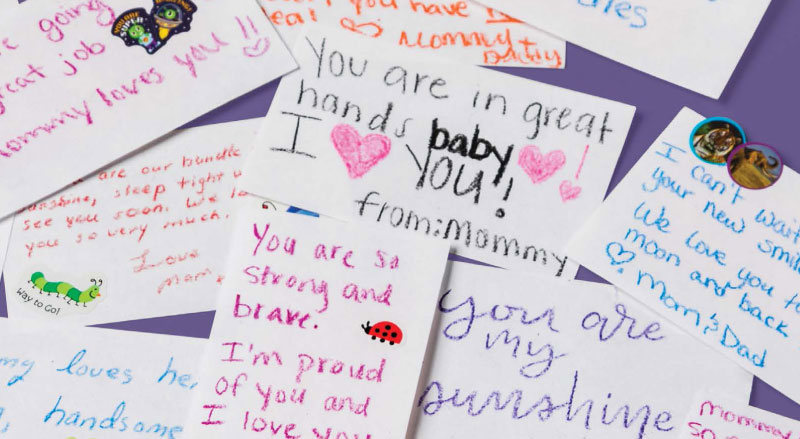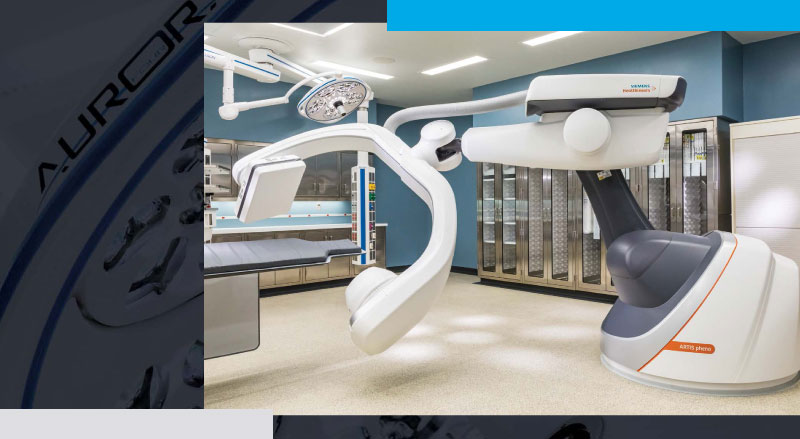“Be brave. I love you, sweet girl.”
The notes are beautiful in their simplicity…
“You are in great hands, baby.”
…and, against the backdrop of their backstories, incredibly powerful.
“You are very strong and brave, and I’ll see you in a little bit.”
A 3×5 notecard + a short message in crayon + a few stickers carefully placed here and there.
“Mommy loves you oodles and oodles, Noodles.”
Behind each hand-written sentiment – each nickname, each expression of love, each hope – are parents whose child is facing the anxiety of surgery.
“Remember that God is with you and He will never leave you. I hope you have sweet, sweet, super sweet dreams.”
Children’s Nebraska has put a name to this new patient- and family-centered project – Anesthesia Whispers, Love Shouts. So simple: a family’s reassuring message is whispered to their child after he or she is wheeled back to the operating room, resonating in some peace of mind all-around. So powerful.
“The project reminds us that the child in our care is entrusted to us by a loving family. The project re-centers us on what really matters in pediatric medicine – the child held in the context of a loving family – and the privilege of getting to care for a loved child,” says Meaghann Shaw Weaver, M.D., division chief of Palliative Care.
Fueled by a belief that “love is the best medicine of all,” Dr. Weaver partnered with Kaitlyn Pellegrino, M.D., one of Children’s board-certified pediatric anesthesiologists, to develop and gain multi-disciplinary involvement in the project, which launched in the spring of 2018.
“A lot of parents write about sleep and sweet dreams. A lot of parents incorporate a special nickname. There are a lot of religious undertones, songs or special memories; whatever is special to the child,” Dr. Pellegrino says. “Love is a message across all of them. A lot of it is, I’m waiting for you. I’m not going anywhere, and I will be here when you get back.’ That is the biggest reassurance that any parent can give their child in this uncertain time of surgery.”
Nichole Nemec offered that very reassurance to daughter Addison at the end of February, before the 3-year-old underwent an upper endoscopy and colonoscopy.
“I told Addison that she was going to do a good job, that she was going to take a nap and I would be there when she woke up. I also wrote that we would get smoothies with her dad and brother and that we loved her,” Nemec says. “Dr. Pellegrino said Addison was excited to hear the note and that, of course, she was excited for the smoothies.”
The idea for the initiative spun from a difficult case – a family whose child was about to undergo a very high-risk, emergency surgery.
“The family wanted to share words with their loved son in the operating room,” Dr. Weaver recalls. “They wrote this affirming and encouraging message to him on a small piece of paper and asked us to bring the note to the surgeon. I handed the note to the operating room (OR) nurse and the OR team read the message to him right before his anesthesia induction. It was a profound moment for everyone in the room to stand in silence as his family’s message was shared audibly in the OR. We were collectively so humbled and inspired by that moment.”
From that experience, Dr. Weaver and Dr. Pellegrino saw a natural next step: offering a similar opportunity to all families before surgery. Dr. Pellegrino says the project speaks to children in different ways, depending on their age: “For the younger children, where it’s more of a separation anxiety from the parents, it’s those parents’ reassuring words, maybe it’s a nickname their mother or father always calls them, that reminds them of mom and dad. For the older kids, it’s just that reassurance that it’s going to be okay.”
The program – and its execution – are truly transdisciplinary. Children’s Child Life specialists explain the purpose of the cards and provide note-making materials to families and children in the C.A.R.E.S. (Children’s Ambulatory Recovery and Express Services) Unit, where pre-surgery check-ins are done. Each child is encouraged to decorate their card, which is eventually passed to the OR nurse.
“Addison kept asking what I was doing when I wrote the card. I told her it was a special note for when she went with the doctors,” Nemec says.
Typically, either the OR nurse or the anesthesiologist will whisper the message to the child as they’re getting settled in the OR. (Sometimes it’s a quick, smooth interaction; sometimes a child is upset and getting that card read is a little more difficult.)
“We couldn’t do this project without the help of the OR nurses, the C.A.R.E.S. nurses and the Child Life team… They have all been so important in the implementation,” Dr. Pellegrino says.
Dr. Weaver says witnessing providers participate in this project is “to experience a really profound moment of care. These messages remind us why we entered medicine and what we strive to ultimately uphold in caring for children. It’s synergistic. Providers are encouraged by the messages families share with their children.”
As a policy at Children’s – to help protect the sterile environment – parents are not allowed in the operating room. That can be upsetting to some, but Dr. Pellegrino says Anesthesia Whispers, Love Shouts offers reassurance that parents are always with their child in spirit, and that we’re always making sure their child knows they’re thinking about them.”
Nemec, who is also a nurse practitioner, agrees: “It allows families to be present for their child when they can’t physically be there. It’s great knowing that the anesthesiologists are not only taking care of your child’s physical well-being but also their emotional well-being.”
After surgery, parents have the option of keeping the cards or donating them for display on a prominent wall in the C.A.R.E.S. Unit.
All we want to do – the nurses, the physicians, the care partners – is take great care of kids.
Kaitlyn Pellegrino, M.D. Board-certified Pediatric Anesthesiologist
“As children have their vital signs obtained before surgery, they get to see these colorful, encouraging messages and they experience a sense of camaraderie right away. Sometimes the children read the messages from other families’ donated cards out loud, and it’s really fun to see them respond to these words of affirmation. They don’t feel alone,” Dr. Weaver says.
Addison, who is “doing great,” chose to bring her card home and still has it. “It definitely meant a lot to her,” Nemec says.
As far as Dr. Pellegrino knows, this program is unique to Children’s – but maybe not for long: “I have friends working in other hospitals who say, ‘I want to do that at my hospital or that’s something we should be doing.”
Anesthesia Whispers, Love Shouts – and when love shouts, it also echoes.
“It’s one of the things that makes Children’s so wonderful – we have a lot of highly trained people, a lot of specialists, and at the end of the day, all we want to do – the nurses, the physicians, the care partners – is take great care of kids,” says Dr. Pellegrino. “That commitment echoes throughout the halls of Children’s.”



